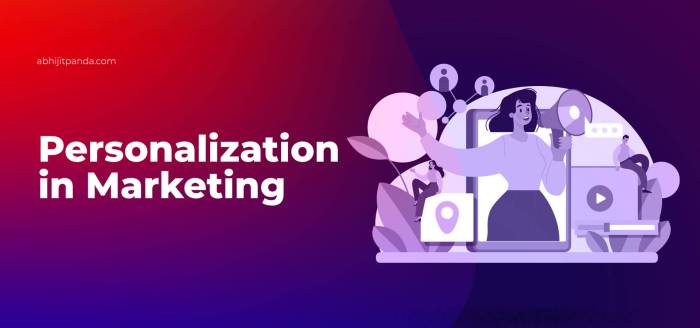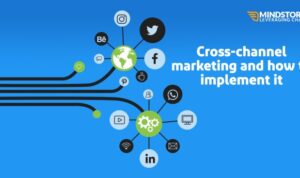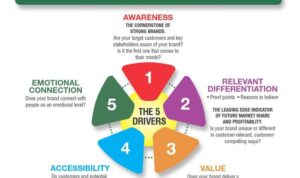Personalization in Marketing sets the stage for this enthralling narrative, offering readers a glimpse into a story that is rich in detail with American high school hip style and brimming with originality from the outset.
Get ready to dive into the world of personalized marketing and discover how businesses are connecting with their customers on a whole new level.
Overview of Personalization in Marketing
Personalization in marketing is all about tailoring your marketing efforts to meet the specific needs and preferences of individual customers. It involves using data and insights to create targeted and relevant messages that resonate with your audience on a personal level.Identifying the importance of personalization for businesses is crucial in today’s competitive landscape. By personalizing your marketing campaigns, you can increase customer engagement, build brand loyalty, and drive conversions.
Customers appreciate when brands make an effort to understand their unique needs and deliver personalized experiences.
Examples of Successful Personalized Marketing Campaigns, Personalization in Marketing
- Amazon: Amazon utilizes personalization by recommending products based on customers’ browsing and purchase history. This approach has significantly increased their sales and customer satisfaction.
- Spotify: Spotify creates personalized playlists for each user based on their listening habits, enhancing the overall user experience and keeping customers engaged on the platform.
- Netflix: Netflix uses personalization to suggest movies and TV shows based on users’ viewing history, leading to higher user retention and satisfaction.
Benefits of Personalization in Marketing

Personalization in marketing offers a plethora of benefits that can greatly impact a business’s success. By tailoring marketing strategies to individual customers, companies can create a more personalized and engaging experience for their target audience, leading to increased customer satisfaction and loyalty.
Enhanced Customer Experience
Personalization in marketing allows businesses to create customized experiences for each customer, catering to their specific needs and preferences. By analyzing customer data and behavior, companies can offer personalized product recommendations, targeted promotions, and relevant content, ultimately enhancing the overall customer experience.
Increased Customer Engagement
Personalized marketing campaigns have the power to capture the attention of customers and drive higher levels of engagement. By delivering personalized messages and offers, businesses can connect with customers on a more personal level, leading to increased interaction, click-through rates, and ultimately, conversions.
Impact on Customer Loyalty and Retention
Personalization plays a crucial role in building customer loyalty and retention. By showing customers that their preferences are valued and understood, businesses can strengthen the relationship with their audience and encourage repeat purchases. Personalized experiences can also create a sense of exclusivity and belonging, leading to long-term customer loyalty and retention.
Strategies for Implementing Personalization

In order to effectively implement personalization in marketing, businesses need to utilize various strategies to collect customer data, leverage AI and machine learning technologies, and create personalized content based on customer preferences.
Methods for Collecting Customer Data
- Utilize website analytics tools to track customer behavior and preferences.
- Implement customer relationship management (CRM) systems to gather and analyze customer data.
- Utilize social media listening tools to monitor conversations and interactions with customers.
- Offer incentives such as discounts or exclusive content in exchange for customer data.
Role of AI and Machine Learning
- AI and machine learning technologies can analyze large volumes of data to identify patterns and trends in customer behavior.
- These technologies can provide personalized product recommendations based on past purchases and browsing history.
- AI-powered chatbots can engage with customers in real-time, providing personalized assistance and recommendations.
- Machine learning algorithms can segment customers based on their preferences and behaviors for targeted marketing campaigns.
Tips for Creating Personalized Content
- Segment your audience based on demographics, behaviors, and preferences to tailor content accordingly.
- Personalize email marketing campaigns by addressing customers by name and recommending products based on past purchases.
- Create dynamic website content that changes based on a customer’s browsing history and preferences.
- Utilize personalized landing pages that cater to specific customer segments and interests.
Tools and Technologies for Personalized Marketing
Personalized marketing relies on a variety of tools and technologies to effectively reach and engage with target audiences. These tools help businesses analyze data, understand customer behavior, and deliver tailored experiences to each individual.
Key Tools and Technologies
- Customer Relationship Management (CRM) Systems: CRM systems store and organize customer data, allowing businesses to track interactions, preferences, and purchase history. This information is crucial for creating personalized marketing campaigns.
- Marketing Automation Platforms: Automation tools help streamline marketing processes, enabling businesses to send personalized messages at scale. These platforms can segment audiences based on behavior and demographics, ensuring relevant content delivery.
- Personalization Engines: These AI-powered tools analyze customer data to deliver personalized content, product recommendations, and offers in real-time. Personalization engines use machine learning algorithms to optimize customer experiences.
- Data Analytics Tools: Data analytics tools provide insights into customer behavior, preferences, and trends. Businesses can use this information to create targeted marketing campaigns and measure the effectiveness of their personalized strategies.
Data Analytics for Personalized Marketing
Data analytics plays a crucial role in personalized marketing efforts by helping businesses understand customer behavior, identify trends, and measure campaign performance. By analyzing data from various sources, businesses can create detailed customer profiles, segment audiences, and personalize content based on individual preferences. Utilizing data analytics allows businesses to make data-driven decisions and continuously optimize their marketing strategies for better results.
Importance of CRM Systems
CRM systems are essential for personalization strategies as they centralize customer data, providing a holistic view of each individual’s interactions with the brand. By leveraging CRM data, businesses can personalize marketing messages, offers, and product recommendations to meet the unique needs of customers. CRM systems enable businesses to build long-term relationships with customers, increase customer loyalty, and drive revenue through personalized marketing campaigns.












